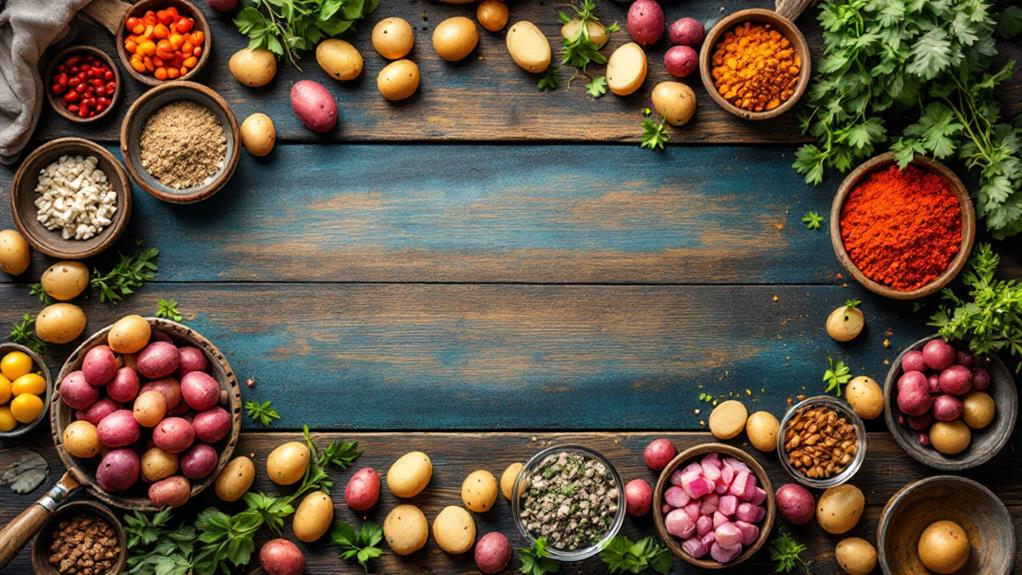Get Your Pear On: Health Benefits and Delicious Pear Recipes
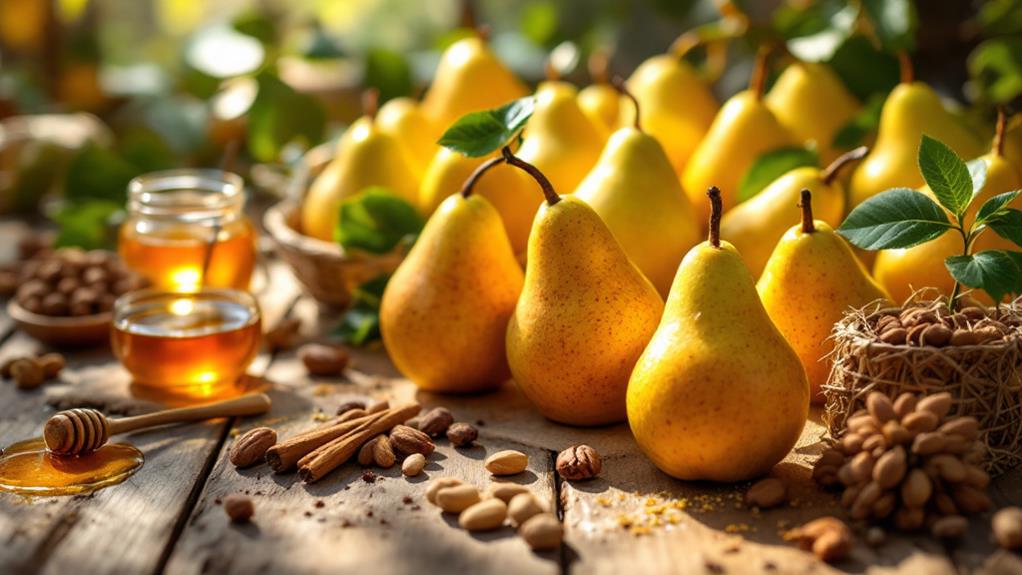
Get your pear on by enjoying this sweet, juicy fruit that offers an array of health benefits. Each pear is low in calories and rich in fiber, vitamins C and K, and potassium, promoting digestive health, enhancing immunity, and supporting heart health. Pears also contain antioxidants that help reduce inflammation and chronic disease risk. Try them in a invigorating pear salad, a cozy pear crisp, or a creamy pear smoothie. With varieties like Bartlett and Bosc at your fingertips, there's a pear for every taste. Uncover how pears can enrich your meals and contribute to your well-being.
Nutritional Value of Pears
Pears are a nutritional powerhouse that can easily fit into your healthy diet. They're low in calories, with just about 100 calories per medium-sized fruit, making them perfect for weight management. You'll find pears to be an excellent source of dietary fiber, offering 22% of your daily needs in just one fruit. This high fiber content aids digestion and promotes gut health, ensuring your digestive system functions smoothly.
Beyond fiber, pears are packed with vital vitamins. They're rich in Vitamin C, which supports your immune function, and Vitamin K, critical for blood clotting and bone health. Including pears in your diet can greatly contribute to your overall well-being.
Pears also provide significant minerals like potassium and copper. Potassium helps regulate blood pressure, which is necessary for heart health, while copper supports different bodily functions. These minerals work together to help you maintain a healthy lifestyle.
Moreover, pears are loaded with antioxidants. These compounds may help reduce the risk of chronic diseases by combating oxidative stress in your body. By incorporating pears into your meals, you're not just enjoying a delicious fruit but also reaping numerous health benefits.
Health Advantages of Pears
Many might not realize just how advantageous pears are to your health. When you're looking for a tasty and nutritious snack, pears should be at the top of your list. One of the main health benefits of pears is their low-calorie content, with a medium pear offering just around 100 calories. This makes them a fantastic choice for weight management.
But that's not all—pears are rich in dietary fiber, providing about 22% of your daily fiber needs in just one medium-sized fruit. This fiber not only aids digestion but also promotes gut health, ensuring your digestive system functions smoothly. Moreover, the high potassium content in pears plays an essential role in regulating blood pressure, which is important for maintaining cardiovascular health.
Pears are also an excellent source of vitamin C, a powerful antioxidant that improves your immune system and may help lower the risk of chronic diseases. The antioxidants in pears further contribute to reducing inflammation and oxidative stress in your body, supporting general health. Incorporating pears into your diet isn't just delicious; it's a simple way to elevate your well-being. So, why not grab a pear and enjoy these remarkable benefits?
Popular Pear Varieties
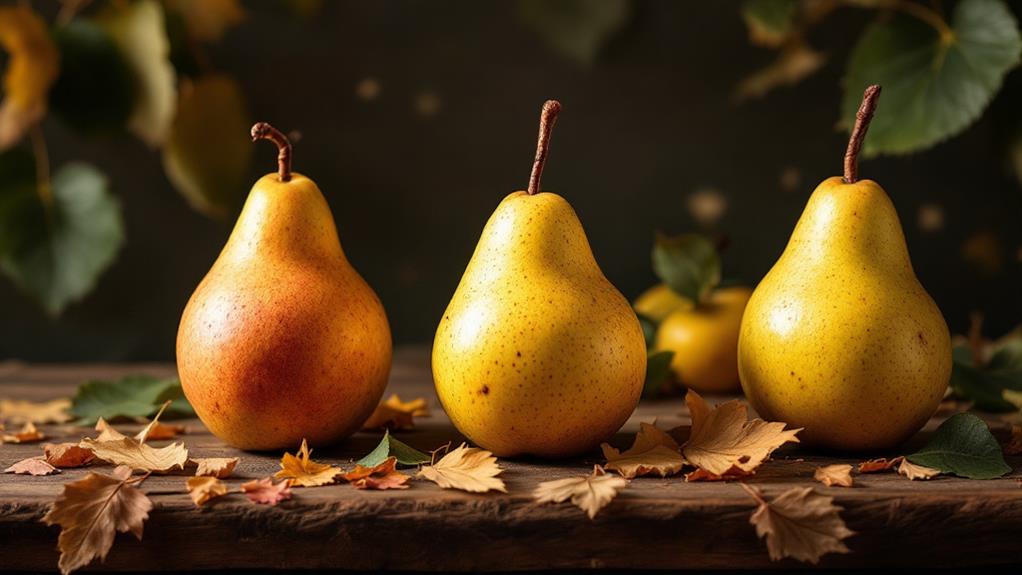
Exploring the diverse world of pear varieties can enrich your culinary experiences and add depth to your meals. Regardless of if you're snacking on them fresh or crafting delicious pear recipes, each variety offers its own unique flavor and texture. Bartlett pears are a favorite for their sweet, juicy flavor. They're perfect for enjoying fresh or adding to salads and sweet treats. If you're looking to bake or cook, Bosc pears stand out with their firm texture, holding their shape beautifully when heated. This makes them an excellent choice for any dish requiring cooked pears.
Anjou pears bring a mild flavor and versatility, fitting well in both salads and desserts. Their adaptability makes them a staple in any kitchen. If you're after a crisp texture, Asian pears deliver a rejuvenating crunch, perfect for enjoying raw or in salads. Red pears, with their sweet taste and lively color, not only elevate the flavor of your dishes but also add an attractive garnish.
- Bartlett Pears: Sweet and juicy, ideal for fresh eating and salads.
- Bosc Pears: Firm and great for baking and cooking.
- Anjou Pears: Mild and versatile for salads and desserts.
- Asian Pears: Crisp and invigorating for raw enjoyment.
Tasty Pear Recipes
With such a variety of pears to choose from, creating tasty pear recipes becomes an exciting culinary adventure. Regardless of if you're crafting sweet and savory dishes, pears bring unique flavors to every meal. Start with a Pear Salad that combines fresh greens, crunchy walnuts, and tangy feta cheese, all drizzled with a robust balsamic vinaigrette. This invigorating dish is not only rich in flavor but also packed with nutrients.
For dessert lovers, a Pear Crisp is irresistible. Slice some pears and bake them under a crunchy topping made of oats, brown sugar, and cinnamon. Serve it warm with a scoop of ice cream for a comforting treat. If you're in the mood for something lighter, blend a Pear Smoothie with fresh pears, yogurt, spinach, and honey. It's a delicious way to enhance your vitamin intake.
Roasted Pears offer another simple yet delightful dessert option. Drizzle them with honey and sprinkle with cinnamon before baking, enhancing their natural sweetness. Pear Chutney is perfect for those who prefer a savory twist. Cooked with onions, vinegar, and spices, this condiment raises meats and sandwiches with a sweet and tangy flavor. Enjoy experimenting!
Selecting and Storing Pears
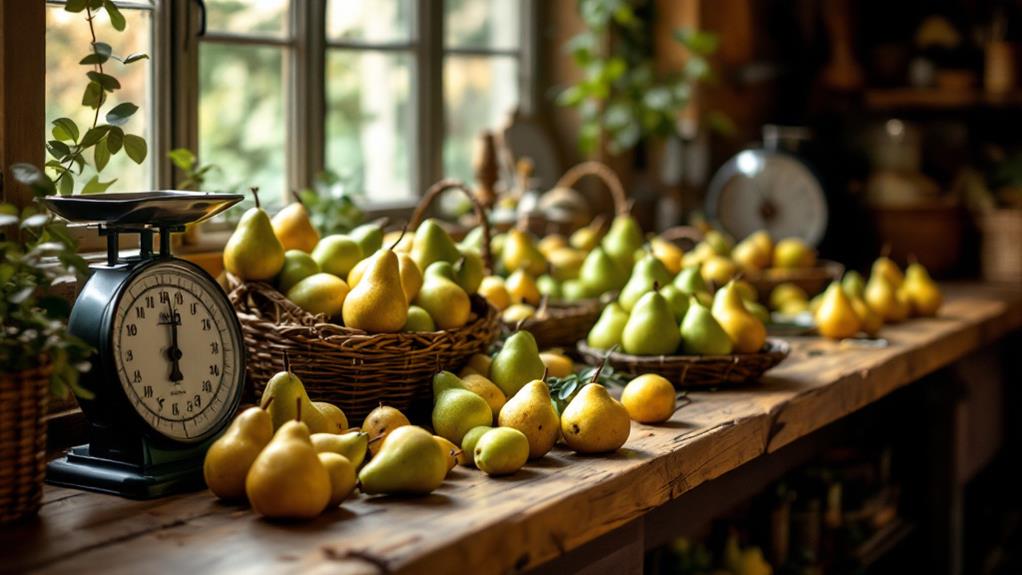
Choosing the perfect pear involves checking for a slight give near the stem, which indicates ripeness, and verifying the skin is smooth without blemishes or bruises. Once you've selected the ideal pears, storing them properly is key to maintaining their flavor and texture. If your pears are unripe, keep them at room temperature for 3-7 days until they reach the desired ripeness. Once ripe, move them to the refrigerator, where they'll stay fresh for up to a week.
When you're ready to enjoy your pears, wash them thoroughly. Avoid washing them until just before eating, as excess moisture can lead to spoilage. If you need to cut pears in advance, coat the cut surfaces with fresh lemon juice. This not only prevents browning but also adds a delightful hint of acidity.
To guarantee your pears maintain their natural aroma, store them away from strong-smelling foods that might alter their taste. Here are a few tips to keep in mind:
- Room Temperature Ripening: Unripe pears need time and warmth to ripen.
- Refrigeration: Helps keep ripe pears fresh longer.
- Lemon Juice: Prevents browning and improves flavor.
- Odor Sensitivity: Store away from pungent foods.
Cooking Tips for Pear Dishes
Once you've mastered the art of selecting and storing pears, it's time to investigate how to transform them into delightful dishes. Start by choosing firm varieties like Bosc or Anjou, which are perfect for baking or sautéing because they hold their shape well. Before cooking, verify your pears have ripened at room temperature. This takes about 3-7 days and helps develop their sweetness and flavor.
To make your pears sweet enough without overpowering their natural taste, add a squeeze of lemon juice or a sprinkle of cinnamon. These ingredients improve the pears' natural sweetness, providing a lovely depth of flavor. If you're baking pears, remember to baste them with their own juices every 15 minutes. This technique keeps them moist and infuses them with delicious flavors.
When preparing dishes with unpeeled pears, wash them thoroughly to remove any wax or residue. The skin not only adds texture but also increases the nutritional value of your dish. By following these simple tips, you'll create pear dishes that are both flavorful and healthy, celebrating the versatility and natural sweetness of this wonderful fruit.
Pears in Different Cuisines
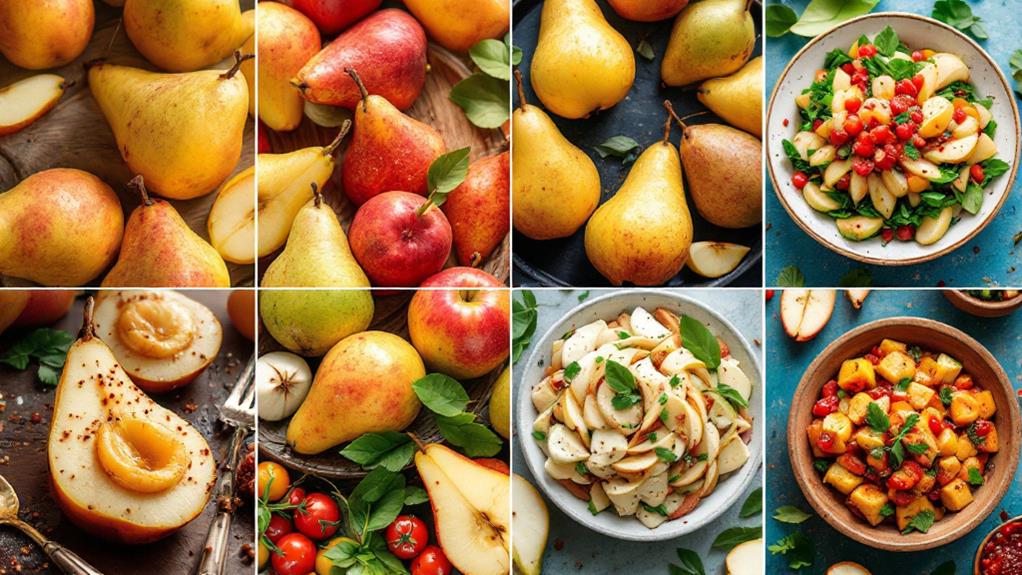
Pears are a global favorite, gracing the tables of many cultures with their delightful flavors and textures. Their versatility makes them a staple in diverse culinary traditions. In French cuisine, you'll find pears elegantly poached in wine or artfully arranged in tarts, showcasing their natural sweetness. Italian desserts also celebrate pears, often pairing them with rich mascarpone or flaky pastries.
Chinese cuisine offers a savory twist, incorporating pears into soups and stir-fries. Here, they provide a subtle sweetness and moisture, balancing out the other ingredients beautifully. Meanwhile, in American kitchens, you can enjoy pears in a range of forms, from invigorating salads to comforting desserts like pear crisp. They're also a fantastic enhancement to sauces, adding depth and complexity.
Middle Eastern dishes frequently combine pears with aromatic spices and nuts, creating a harmonious blend of sweet and savory flavors in stews and tagines. Different pear types, such as Bosc and Anjou, bring unique textures that cater to multiple culinary applications.
- French Delights: Poached pears and rustic tarts.
- Italian Elegance: Mascarpone and pear pastries.
- Chinese Savory: Soups with a sweet twist.
- Middle Eastern Fusion: Spiced stews with pear accents.



